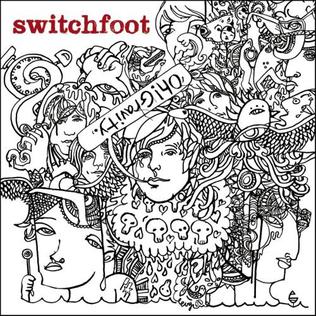 I was at my friend Andy’s house, and I just happened to notice that he had Switchfoot’s new album, Oh! Gravity. just as I was leaving. He said, “You wanna borrow it? It’s really bad.” I thought sure, Andy. Switchfoot couldn’t possibly be bad. All their other albums were at least passable, so they couldn’t possibly make a switch that was so dramatic. So what’s the worst that could happen? How wrong I was…
I was at my friend Andy’s house, and I just happened to notice that he had Switchfoot’s new album, Oh! Gravity. just as I was leaving. He said, “You wanna borrow it? It’s really bad.” I thought sure, Andy. Switchfoot couldn’t possibly be bad. All their other albums were at least passable, so they couldn’t possibly make a switch that was so dramatic. So what’s the worst that could happen? How wrong I was…My first thought after listening to it for the first time was that it would be awesome if we had a time machine, so we could go back to before this record came out and either convince the members of Switchfoot that putting this record out was a bad idea, or kill them. Kinda savage, I know, but if that’s the price we have to pay to have this horror NOT unleashed on the world, then so be it. That was just a visceral reaction, and obviously my hatred of this album has lessened some. It is not, however, enough to keep me from anti-recommending this abortion with extreme prejudice.
From the very first second of the record, Switchfoot takes a wrong step. The song “Oh! Gravity.” sounds like a throwback to the worst part of the 80s, the part with wild hairstyles and spandex pants. The title is horrible for the song, let alone naming the album after it. After that comes “American Dream,” one of the only listenable tracks on the album. I kind of appreciate the disillusionment he expresses on this and “Circles,” but it’s getting a little old, as that was the central idea behind Nothing is Sound. “Dirty Second Hands” has a discombobulating and inconsistent groove to it, and while it does kind of intrigue me, it’s just too sloppy to be worth it. “Awakening” harkens back to the days of Learning to Breathe and The Beautiful Letdown, and the respite is welcome. And “Head Over Heels” has a mournful aspect to it that is kind of nice, even if Jon Foreman shouts where he should whisper.
I haven’t touched on the incredible ineptitude and presumption that the album displays, however. My first example is “Amateur Lovers.” First off, this song is an attempt at a carbon copy of the Nothing is Sound track “Easier Than Love,” which is a horrible enterprise at the very start. “Easier Than Love” smartly took an abstract and personified it, and that leaves “Amateur Lovers” with nowhere to go. Jon Foreman must have been trying to make up for the lack of ideas by upping the intensity of the song, but he sounds like an over-excited tuberculosis patient when he does that. I don’t understand the shift towards gruff intensity that Switchfoot has taken in their last few albums, since they do subtle beauty so much better. This song is horrible, and I’m surprised that Switchfoot thought we were stupid enough to fall for it.
My second example is “Faust, Midas, and Myself.” This song has problems up the Yangtze, from tune (unmemorable) to rhythm (grating) to lyrics (shut up, just shut up) to variety of sound (it has none). The lyrics represent Foreman’s tendency towards very cerebral and philosophical songwriting gone awry. The song has an absolutely wretched title (that makes two), and the music is wrong-headed and infantile. My third example is “
I better wrap up this review before I get too angry. When the anger fades, however, there will only remain disappointment that Switchfoot has hit their first low. It’s one of inept musicality, and worse, derision towards the audience.
American Dream

